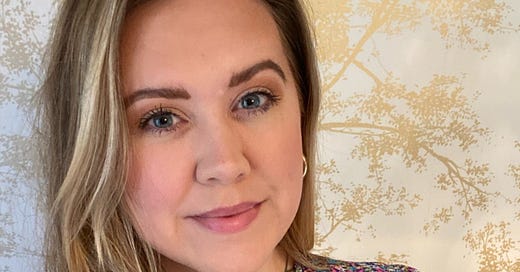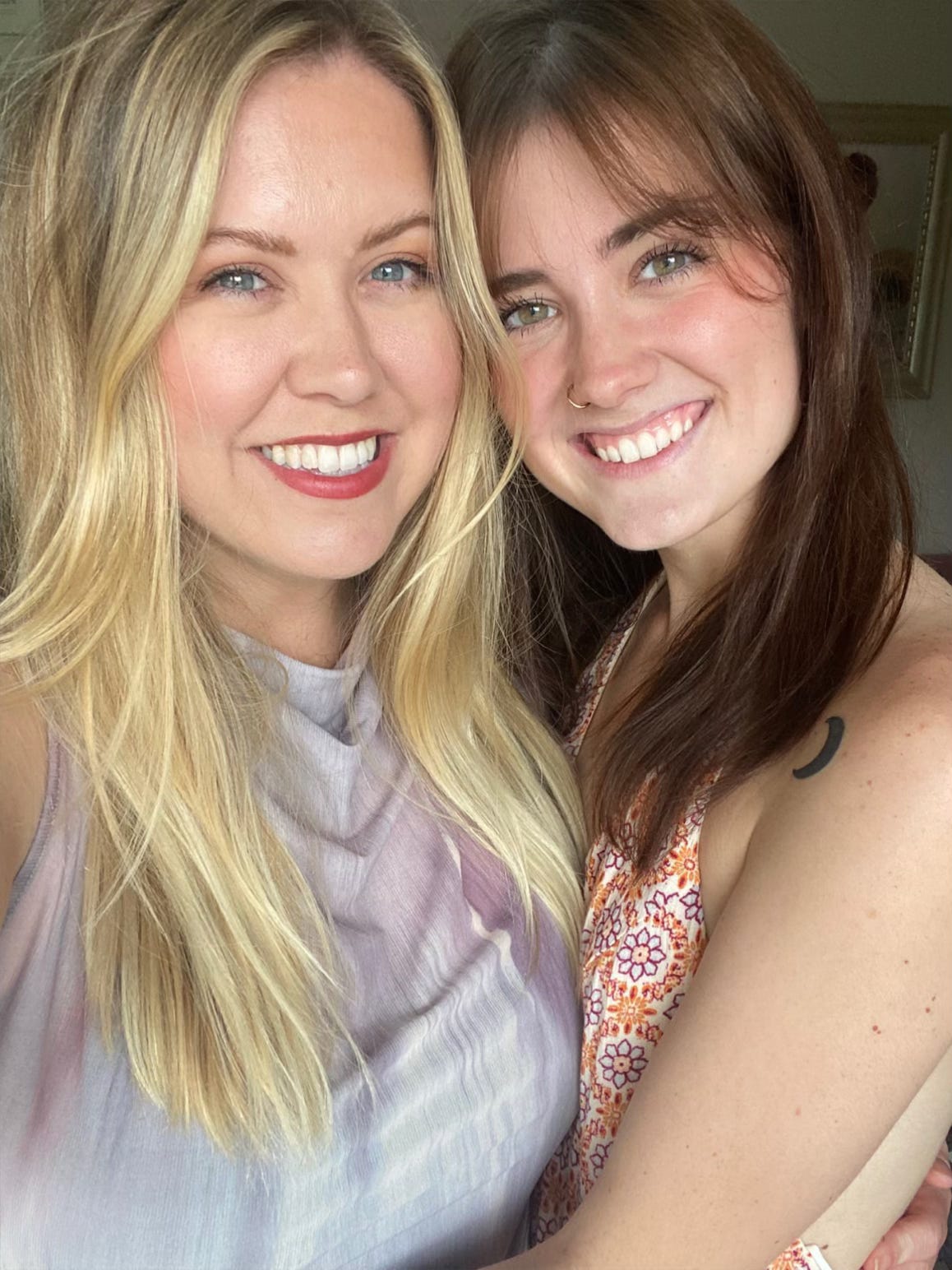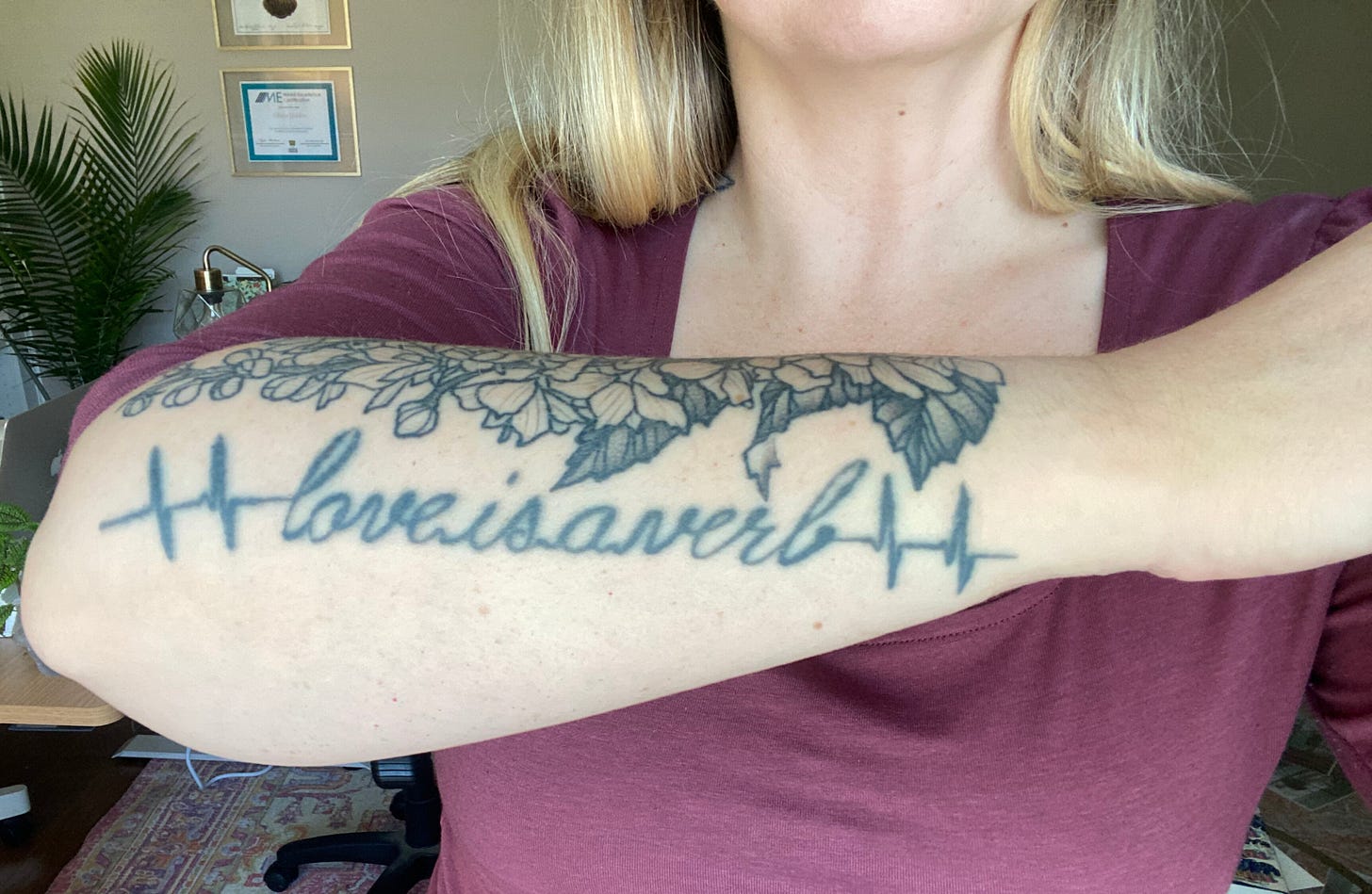A pacemaker and a baby in the same year
It wasn’t Allison Holden’s plan, but “everything just lined up perfectly.”
Hello! I’m Leigh Kamping-Carder, and this is The Heart Dialogues, the newsletter for people born with heart conditions (and the people who love them). Every other week, I bring you a candid conversation with someone who has congenital heart disease, plus occasional essays, links, recommendations and other good stuff about living with a wonky heart. Add your email to join this community and ensure you don’t miss the next edition.
When Allison Holden had her pacemaker implanted, her biggest concern was making sure her navel piercing didn’t close up, since she had to remove the jewelry for the surgery. It was December 2002, she was 18 years old, and within weeks she was celebrating New Year’s Eve with her friends. “You're invincible when you're 18, you know?” she said. Nine months later, she had a baby girl, Quinlan, who is now 19.
Allison’s life hasn’t always gone the way she planned, but it has worked out auspiciously just the same. Now 38, she was born with Transposition of the great arteries, a congenital heart condition where the two main arteries are reversed. She had a Mustard procedure at 6 months. In January 2022 she experienced an episode of atrial fibrillation (Afib) that landed her in the ER and required a cardioversion, a procedure that shocks the heart into normal rhythm. Today, she is a wife, mother and Realtor living in the Memphis suburb of Germantown, Tenn.
Allison, who goes by @agentallisonmem on Instagram, spoke with me about having a baby girl, coping with health anxiety and why she’s starting to get more comfortable planning for the future.
What was it like for you growing up with a congenital heart condition?
I feel like I had a pretty normal childhood. My parents were wonderful at making me feel normal. I think I felt special, to be honest with you, that I went to see my cardiologist. It was always a pleasant experience. I did not have any surgical interventions from the time that I was 6 months old to 18 [years old]. So, other than the occasional Holter monitor, there was nothing too scary about having a heart defect.
The only times that I think I felt different was maybe gym class at school, just because I'd always heard, “If you feel tired or if you feel different, you just need to rest. Don't push yourself.” Things like that stick in your mind a little bit. On the one hand, I didn't really know what that meant. But I was a child, so as a child you're not going to ask very analytical questions. I just wanted to be careful with myself in a way that I think my peers didn't feel the need to be.
Were you getting regular pediatric cardiology care?
Yes. I went either every year, every six months. I never had any ER trips as a child. I never had any arrhythmias that they had to treat. I got the pacemaker because my heart rate was slowing down too much at night. I think it got into the 40s. I really haven't had any complications from my defect until last January, I went into Afib. That was so scary. I did have to go to the ER and I was in the [cardiovascular intensive care unit], and I did get cardioverted. It was very scary. That has actually probably catapulted me to a whole different level of anxiety than I think I had previously.
I want to jump back to when you were 18 and had this first intervention as an adult. What did that feel like?
Oh gosh. Looking back, I didn't realize the severity of it. I think I felt special. I was going through something that no one else was. I don't think I felt scared. That was just due to a lack of awareness of how dangerous it was. Maybe I lived a little bit in a coddled, spoiled childhood or something. I do remember waiting to have surgery, and my aunt had brought me some cute little frog socks, and putting those on my feet. I don't remember feeling very scared up until probably the moment they were about to wheel me back. And then I was like, oh God, it's real.
When I woke up from that surgery, and I was in the ICU, my biggest concern at 18 was getting my navel ring back in because I had to take it out for surgery. I harassed my mom, like, “Mom, can you put it back in? I don't want this hole to grow back.” I think that gives you a good glimpse into my state of mind at that age. I had that surgery December of 2002. There are pictures of me that New Year's Eve, dressed up, with makeup on, going out.
You also mentioned you've had an issue with the lead on your pacemaker.
I have a lead on my pacemaker that they think probably needs to be replaced, but they're putting it off for pretty obvious reasons. The way that my defect is and the way that I've had the open heart surgery at 6 months old, they don't want to go back in and disrupt all of that and create more scar tissue. The leads are actually on my heart muscle as opposed to intravenously. To put on a new lead, it's invasive, and they're like, “We're not even sure we can find a spot.” They think that that one lead, which of course happens to be the one I use the most, is covered up with scar tissue. That's their best guess. Because of that, the voltage is turned up really high on my pacemaker to make that lead work. Because the voltage is turned up so high, I'm having to get a new pacemaker every three years. But it's a much less invasive procedure to go in that little pocket in my abdomen under my ribcage and switch out the battery than it is to go into the heart.
Before this ever got diagnosed as the issue, I was having a lot of what I just thought were palpitations. I said, “Something's wrong, something's going on. It's happening a lot at night when I'm laying down to go to bed.” I would go into the doctor, and they wouldn't see anything on the EKG. And I'm like, “Something's going on.” So that's when they referred me to this new team, and they were able to see that the issue was the pacemaker. They could tell that that lead wasn't hitting all the time, and it was making me feel like I was missing a beat. I have not had those symptoms since they turned up the voltage, thank God, because if I continued to have the symptoms, I mean, the only recourse would be to change out the lead.
And that would be an open heart procedure?
They would attempt to first go in intravenously, but if they couldn't do that, they would have to open me up. So they're trying to avoid that. It is scary to hear that a cardiologist doesn't want to do what might have to be done. That's given me a lot of anxiety.
How do you cope with that?
Focus and discipline. That's one thing that I've noticed I have a little bit more of than “normal people.” You just focus on your day to day and you just don't let your mind rule over you versus you ruling over it. I don't know if I have good coping mechanisms, other than just trying to stay grateful and in the moment.
This happened all kind of within the last year. Since I had that episode of Afib, I've completely stopped drinking. No pot or anything. In a way, it's been this new beginning too. Not to make it all rosy colored. I try to keep it at a minimum of feeling sorry for myself.
It's definitely the motivation to reach out to you. We have such a quiet community. Cancer has a very loud community. There's a lot of support for cancer research. But adults with congenital heart defects, where are we? We're not constantly in the hospital, which is a great success, but how do you still at the same time say, we have a lot of mental health struggles because of this? It is kind of a hidden thing.
That's something I think about a lot too. Why don't more people know about congenital heart defects and that they’re a lifelong issue, given that, relatively speaking, they're actually pretty common?
That's such a good question. For me as a young woman, I wanted to be considered a lot more things than having a heart defect. I wanted to be considered fun and pretty and social and engaging. I don't think that I thought of myself as a spokesperson for congenital heart defects. Now as I'm getting older and those things matter less to me, I'm starting to shift my energy to that kind of thing.
How does your CHD show up at work?
Work has been difficult in the past, with the need for surgeries, mainly pacemaker replacement surgeries, and then of course downtime after that, not being able to drive and things like that. Now that I'm a Realtor, oh my gosh, life is so much easier when it comes to scheduling off time for myself. Though, I will say, if I'm not working, I'm not making money. Now I have the freedom of not waking up to an alarm clock most days. I do work from home most of the time. My schedule is very flexible. It's been a total game changer to work for myself. I've been hugely successful.
Does CHD ever come up at showings?
Luckily, it has not interfered yet. I've been fortunate to be very healthy overall.
How does your husband deal with your heart stuff?
He is wonderful. We started dating in January of 2017. Then in May of 2018, I had gone to see my cardiologist, and they did the pacemaker checkup, and I think I had six months to nine months, something like that, left on my pacemaker battery. And then my pacemaker defaulted like a week later. It was one of those, go to the ER, and then I had surgery the next day. That was pretty early into the relationship. That was his first trial run of being with a heart patient. He took excellent care of me. He's a very “acts of service” love language person.
The main thing that we struggle with is my anxiety. He does not understand my anxiety at all. I will get upset with him about that, and he gets upset with me. I don't like flying. That's an understatement. I’m terrified of flying. I think it's a health-related thing because it makes me feel weird, and I just get scared. He wants us to travel. I feel bad for him sometimes being tied to me because of my limitations, even if they're self-invented.
My husband has a 100-acre farm outside of Jackson, Tenn. It's very rural. I have a lot of anxiety about going up there. It’s too far from medical care. I get nervous about doctors in that rural area not knowing what Transposition is. That’s hard for my husband probably because he loves the farm. A cabin in the woods, that's like my worst nightmare [laughs].
You said you have a daughter.
Yeah. I had my pacemaker implantation surgery in December of 2002. I had Quinlan in September of 2003. So I'll let you do the math there.
I think that that's just one of those God things. I'm not very religious or anything, but it's one of those things that just cannot be explained. When you look back at your life, you're like, “Wow, everything just lined up perfectly.” One, who knows if I hadn't gotten a pacemaker if everything would've gone as swimmingly as it did with my pregnancy and childbirth. Two, I had gotten some information much after I had Quinlan that maybe we should be cautious about having kids or maybe you shouldn't have any more children. If I had not had Quinlan at such a young age, I would not have had children, most likely. In fact, now I have my tubes tied.
Was it a “normal” pregnancy?
I was considered high-risk. We did do a 4D ultrasound of her heart when I was pregnant, just to look for any heart defects. That was probably the most emotional that I got while I was pregnant, when they told me everything looks good. She has all four chambers. They all look great. I cried and was very grateful. She's been very healthy. They did induce me probably a week or so before my scheduled due date, just to have everything in a controlled environment. I did have an epidural, but I was able to give birth vaginally. Everything went great, and as far as I'm aware, it didn't cause any issue for my longevity or my health.
What else is important for us to talk about?
I was trying to think of what I wanted to discuss with you and, honestly, I wanted to truly just create awareness. I guess I just wanted to be a part and say, “I'm here too. I’m part of this community.”
I have a lot of fear around the future. I always have. In fact, it’s why my husband says I have such bad financial knowhow [laughs] because I want to spend all the money that I make. Because I’m like, “Save for what?” And he's like, “If you have a future, you'll need money.” And I'm like, “I know, you’re right.” For a long time when I was younger, I lived like there was no tomorrow. Now as I get older and I approach 40, I'm like, I guess I should start.
I finally got the guts to ask my doctors, “Do you expect any shortened lifespan or outcome?” And they were like, “No, not really.” But you can't help that thought. I feel like that thought's always in your mind when you have something wrong with your heart.
How do you think that knowledge has affected some of the big decisions in your life?
It definitely has affected probably every single one. For as long as I can remember, I've had this appreciation for the simple things in life that I see that it's so difficult for most other people to have. You see that a lot in people where they're just really weighted down by life. And I'm not trying to call people out for that. I understand it. But when you go through big things, one of the beautiful things that happens is that you get this big picture that you didn't get before. My husband, when he sees a car accident, he calls me and he's like, “I just wanted to call you and say I love you.” My whole life has been a portrait of reaching out in love because it comes so much more naturally to me because I think, what if I go to bed tonight and this is the last time that I interact with my daughter, or my husband, or my parents or the world? I want people to be able to say about me, “Well, she definitely lived and she definitely was grateful to be here.” And what more could you ask from a life?
Interview has been condensed and edited.







